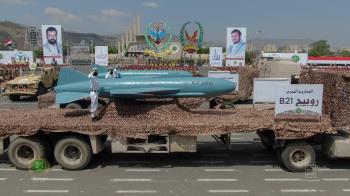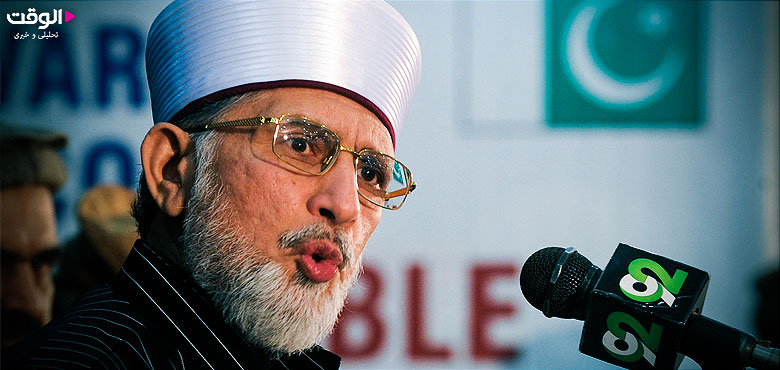Alwaght- The Pakistani politician Tahir-ul-Qadri in early 2013 and mid-2014 led the anti-government protests and announced that he meant to organize a revolution in Pakistan.
Just several months after staging sit-ins and leading rallies in September 2014 Qadri all of a sudden returned to London and from there to Canada. But now he is back again to Pakistan and is leading a campaign that is named Qisas Movement. The backers of Qadri-led Pakistan Awami Tehreek party have been staging rallies in Multan, Lahore, Rawalpindi, Karachi, and Quetta since August 27. Qadri has said that the massive rallies in protest of the Islamabad government will continue. The protests are coming under Qisas Movement to condemn the performance of the politicians and are seeking revenge for the victims of Lahore protests two years ago.
It is notable that when Qadri returned to Pakistan in 2014, the government of Prime Minister Nawaz Sharif didn't allow his plane to land in the capital Islamabad, and so he had to fly away to Lahore. During the massive anti-government demonstrations of pro-Qadri people over 14 were shot dead by the security forces and dozens were injured. Now he has launched the Qisas Movement to protest killing the demonstrators, Sherif's policies, and far-flung poverty and corruption throughout the country. It is predicted that Qadri-led demonstrations will continue though in another form. It is still unclear why Qadri arranged anti-government protests for his supporters and why then he flew back to London and Canada. Without doubt no protest movement can be organized without backing from power structures including the army, the government, and powerful political parties.
This report brings in spotlight why Qadri-led movement that in different times spoke out against the government's incompetence and promised leading a revolution has held relations behind the scenes with the army, and when the government of Nawaz Sharif settled problems with the army in mid-2014, Qadri left the revolution unconcluded and returned to Canada. In fact, the army is striving after creating a third party to maintain Pakistan People Party and Muslim League. The Qadri-led movement and a coalition of small parties along with the army are supposed to step in the country's future power structure and at the same time be pro-army.
In recent years the political standings of Tahir-ul-Qadri who at the same time is leader of Awami Tehreek party have been subject of discussion and debates. During the rule of General Pervez Musharraf, Qadri was among the first prominent figures in the country to support his military coup, and found that necessary. Qadri assessed the political parties as incompetent and corrupt and branded Musharraf as savior of the country. At that time, many internal analysts in Pakistan drew links between the Qadri-founded Minhaj-ul-Quran organization and the army generals. This doubtful matter is still existing. Actually, there is a notion that Minhaj-ul-Quran and Tahir-ul-Qadri personally are part of the play card and the army's project, specifically the Inter-Service Intelligence (ISI), and in time of need they help the army proceed with its plans without need for staging military coup or direct intervention in power. In fact, the moves that Tahir-ul-Qadri made after his return from self-exile in Canada in 2014, the least of which were arranging the 350-kilometer rally from Lahore to Islamabad and staging sit-ins to sink the newly-formed government of Muslim League led by Nawaz Sharif who was in severe race with the army generals over the power, prompted serious speculations about links between the army generals, particularly the ISI’s, and Qadri's movement.
Just against his expectations, the political parties declined to support his movement and so the 4-million-people rally that he expected to form in Islamabad and also his plans to forcefully seize control of government buildings and sensitive offices were met with failure and at most between 100,000 and 150,000 protestors plagued the capital for a couple of days. The movement ended after a compromise between the government and Qadri, and then he moved back to Lahore and flew back to Canada, where he has second citizenship. Qadri's slogans and fiery speeches during which he called for the capital to well receive the protesters and stage an Islamic revolution gave the notion that the army and the judicature had his back, but people did not support him as he anticipated, and at the same time neither the political parties nor the domestic and international conditions were fit for a military coup in the country. So, in last minutes the plans of seizure of government buildings were reduced to only taking control of a TV station that took place by some experts under the guise of ordinary people. They, however, didn’t get the chance to operate the TV station and announce victory of their Islamic revolution. It ended in looting the cameras and other facilities, and the army led them home respectfully.
In June Qadri returned to Pakistan and is planning fresh rallies to remove the government of PM Sharif from power. The rifts between coalition government of Nawaz Sharif and the army generals, particularly the ISI agents, existed even before the demonstrations.
Sharif-led government and the powerful army generals are at odds over the two sensitive cases of how to deal with India and also how to deal with Afghanistan developments and the peace between Taliban militant group and Kabul government. The earlier conditions are still standing. The conditions are not appropriate for the army to overthrow coalition government through military coup. The internal and external conditions don't support a coup. Although the army improved face among people by fighting the radical Islamist groups in North Waziristan, it is still blamed by Washington for its double standards as it supports some radical sides while fights others. Now the US aids to the army have been frozen.
Differences between Sharif and some army generals have resurfaced. It is in this situation that Qadri and Minhaj-ul-Quran have reactivated efforts. The earlier slogans of fighting corruption, removing the government, and holding snap elections are returning and the army is being promoted as the savior of the country. Meanwhile, the words spread about a new project by the army that is branded the "third way."
The third way can be extracted from the army rifts with the political camp that supports Muslim League party. In other words, Qadri, Minhaj-ul-Quran, the prominent politician Imran Khan, and Tehreek-e-Insaf party are planned to rise to center and the army gathers together the small parties under a united camp and encourages some prominent and influential figures in Pakistan Peoples Party and Muslim League to break unity in these two major parties to pave the way for victory in the upcoming election.
Organizing marches by Minhaj-ul-Quran due to its Sunni influence and possible cooperation of Imran Khan and Tehreek-e-Insaf party that holds sway in Khyber Pakhtunkhwa province come with the aim of putting strains on Nawaz Sharif to step back and accede to forming an interim government tasked with holding early election. Very likely Qadri will set out with his second rally from Lahore to Islamabad with these objectives, as he is supposed to enjoy secret support. But there are doubts that he can begin a full-scale Islamic revolution in Pakistan by his movement especially that the two major parties of Pakistan, namely Peoples Party and Muslim League, have agreed to compromise and so allow Nawaz Sharif to end his legal 5-year term in office and be a second government that like government of Peoples Party ends its legal term and holds election.
On the other side, Sharif has made another significant move. He made the army generals dubious about stepping to gain early power. The Pakistani PM said that he will promote General Raheel Sharif, who currently serves as Chief of Army Staff, to a five-star general after retirement, a title given only to General Yaqub Khan in the history of Pakistan.
But it is not clear if such tactics by PM Sharif will be successful in causing changes to the army's third way project. But Nawaz Sharif and his backing parties are hoping that they are not forced to give in to pressures. They hope to weather with a lowest possible cost the crisis that Qadri is seeking to fan in a bid to prepare the ground for army to regain the power in the country. It is not clear what will happen in upcoming months in Pakistan but the strategy of the army generals is obvious: supporting a third camp with Minhaj-ul-Quran movement and low-impact Qadri-led Awami Tehreek party in center. There will be joining of forces with Imran Khan-led Tehreek-e-Insaf party that has the backing of army, something open to all. This is the project that the army generals and ISI are seeking to realize in a bid to rebuild power in association with the third-degree parties in a time that the two major parties of Pakistan Peoples Party and Muslim League are showing independence in foreign and domestic policy decision making and the internal and international circumstances disallow a military coup in the country.
Finally, it must be said that the reality is any political and religious movement– no matter Shiite or Sunni– has relations with some countries and power centers, and needs their support for its objectives. Certainly, Qadri movement has connection with the army to actualize its agenda in Pakistan. At the same time, the army needs a moderate political party to contain the coalition government. In such conditions, the army struggles to raise the capacities of Qadri-led Awami Tehreek party and even Tehreek-e-Insaf party led by Imran Khan to secure stability for the country.



























